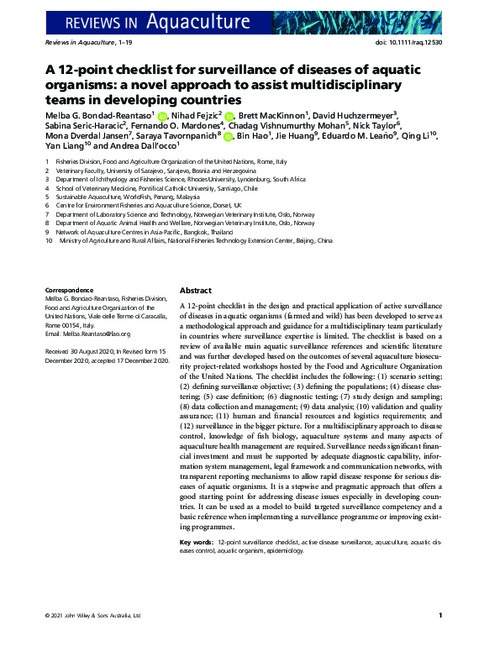A 12-point checklist for surveillance of diseases of aquatic organisms: a novel approach to assist multidisciplinary teams in developing countries

A 12-point checklist in the design and practical application of active surveillanceof diseases in aquatic organisms (farmed and wild) has been developed to serve asa methodological approach and guidance for a multidisciplinary team particularlyin countries where surveillance expertise is limited. The checklist is based on areview of available main aquatic surveillance references and scientific literatureand was further developed based on the outcomes of several aquaculture biosecu-rity project-related workshops hosted by the Food and Agriculture Organizationof the United Nations. The checklist includes the following: (1) scenario setting;(2) defining surveillance objective; (3) defining the populations; (4) disease clus-tering; (5) case definition; (6) diagnostic testing; (7) study design and sampling;(8) data collection and management; (9) data analysis; (10) validation and qualityassurance; (11) human and financial resources and logistics requirements; and(12) surveillance in the bigger picture. For a multidisciplinary approach to diseasecontrol, knowledge of fish biology, aquaculture systems and many aspects ofaquaculture health management are required. Surveillance needs significant finan-cial investment and must be supported by adequate diagnostic capability, infor-mation system management, legal framework and communication networks, withtransparent reporting mechanisms to allow rapid disease response for serious dis-eases of aquatic organisms. It is a stepwise and pragmatic approach that offers agood starting point for addressing disease issues especially in developing coun-tries. It can be used as a model to build targeted su veillance competency and abasic reference when implementing a surveillance programme or improving exist-ing programmes.
Permalink
Date Available
Type
Publisher
ISSN
1753-5123
Copyright
CC-BY-4.0
Research Themes
Language